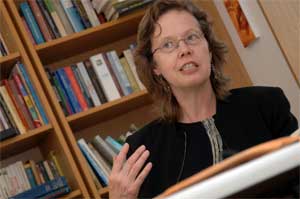 |
| Taxes "are the monetary expression of our values," says Dr. Shirley Tillotson (Abriel photo) |
A tax acted as the spark that lit the American Revolution. The reviled Tea Tax of 1773 was regarded as yet another attempt by the British Parliament to squash American freedom.
And, in France about the same time, a tax on salt became the most hated levy in the country. The ├ĺgabelleÔÇŁ is regarded as one of the root causes of the dissatisfaction that led to the French Revolution.
If there├Ľs anything that can get people up in arms, it├Ľs taxes. But here in Canada, the historical literature says little about the violence and drama of tax resistance.
├ĺHave struggles around taxation played so little part in forming Canada├Ľs political culture?ÔÇŁ asks ║┌┴¤│ď╣¤═°history professor Shirley Tillotson.
She suspects there's something more to it, which is why she├Ľll be studying the cultural history of taxation in greater depth, thanks to a three-year, $88,900 standard research grant from the Social Sciences and Humanities Research Council of Canada (SSHRC).
Paying taxes, she says, is a monetary expression of the values we hold as a nation. And, when someone announces, ├ĺI├Ľm a taxpayer,ÔÇŁ what they├Ľre really saying is that they have the right to speak and be heard. Paying taxes also infers rights.
Dr. Tillotson├Ľs research is just one of the research projects at ║┌┴¤│ď╣¤═°to be supported by SSHRC. The federal funding agency announced┬á$77.8 million in standard research grants in Canada, including $804,000 for research at Dalhousie.┬áAll told, the┬áinvestment supports some 2,800 research projects, including 841 new projects involving 1,581 researchers across the country.
|
- Jennifer Bain, Assistant Professor Music, for research on Medieval composer, Hildegard von Bingen, a 12th-century abbess and arguably the world├Ľs first woman composer.
- Yuri Leving, Assistant Professor of Russian, for a project entitled ├ĺBecoming a Great Writer.ÔÇŁ He├Ľll examine how Vladimir Nabokov, best known as the writer of Lolita, transformed himself┬áfrom an emigre professor┬áinto a best-selling author.
- Marjorie Stone, Professor of English and Women├Ľs Studies, for three major projects focusing on the influential 19th-century English poet Elizabeth Barrett Browning.
- Elizabeth Kay-Raining Bird, Professor, School of Human Communications Disorders, for her ongoing study of the language abilities of bilingual children with Down Syndrome.
- Patricia Glazebrook, Associate Professor, Dept. of Philosophy, for research into the role of women in Ghana's agricultural economy.
- Stephen Porter, Associate Professor, Dept. of Psychology, for ├ĺDangerous Decisions: Investigations of the Communication and Identification of Concealed and Fabricated Emotions.ÔÇŁ
- Fiona Black, Associate Professor, School of Information Management, for ├ĺInvestigating Complexity in Information Systems: The Example of Print Culture and Geographic Information Systems.ÔÇŁ
- Bertrum MacDonald, Professor, School of Information Management, and Peter Wells, School for Resource and Environmental Studies, for ├ĺFrom Science to Policy and Decision-Making: Investigating the Use and Impact of Grey Literature of National and International Governmental Agencies Focused on the EnvironmentÔÇŁ
- Michael Ungar, Associate Professor, School of Social Work, for research on the protective processes used by children growing up in difficult environments. For more information on Dr. Ungar's work, see the story: .
SSHRC is an independent federal government agency that funds university-based research and graduate training through national peer-reviewed competitions.

